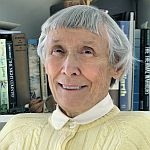 (HOST) Commentator Ruth Page has learned of a dispute in which "natural resource" is defined in two different – and conflicting – ways.
(HOST) Commentator Ruth Page has learned of a dispute in which "natural resource" is defined in two different – and conflicting – ways.
(PAGE) At first sight, Bryce Canyon in Utah can take your breath away. Like many of our natural treasures, it begs to be preserved for future generations. "I want my children and grandchildren to be able to see this some day," you think as you look down at Nature’s 9,000-foot-high redrock towers. They’re so breath- taking they seem to have been constructed by a sculptor taught by divinity.
Visitors flock there on moonless nights to enjoy the best view of heaven’s stars on this continent. While you and I may see some 2,000 stars if we are out in the countryside on a clear night, at Bryce, which has the clearest, darkest skies on the continent, experts say it’s possible to see (but too confusing to count) the seven thousand five hundred stars that in fact are sparkling overhead. It’s a vast display in Earth’s greatest theatre.
Yet the Natural Resources Defense Council says that the Utah Department of Natural Resources has approved a plan to allow the Cold Hollow Strip mine to put a large, inevitably filthy coal mine just ten miles away. It would operate around the clock, six days a week, producing two million tons of coal a year for three years.
That means Bryce will suffer air pollution from the mine workings, and from endless lines of huge trucks hauling coal on the highways. If the mine is built, Bryce’s treasured starbright skies will be lost. In daytime, the clear air that allows visitors to look across Bryce’s wide vista of towering rock formations will turn smoggy; traffic heading for Bryce, Zion, and Grand Canyon National Parks will have to use highways clogged with coal-trucks releasing pollution in all the towns they pass through. Utah will be a poorer state.
Environmental groups are trying to block the mine scheme; I wish them luck, but it may be a long and costly fight with no guarantee of success.
(TAG) You can find more commentaries by Ruth Page on-line at VPR-dot-net.